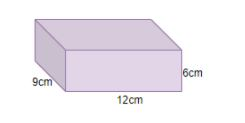
How many cuboids of size $4cm\times 3cm\times 2cm$ can be made from a cuboid of size $12cm\times 9cm\times 6cm$.
Answer
589.2k+ views
Hint: We solve this problem by starting with finding the volume of the larger cuboid using the formula for the volume of the cuboid, $\left( length \right)\times \left( breadth \right)\times \left( height \right)$. Then we use the same formula to find the volume of the smaller cuboid. Then we assume the number of smaller cuboids as n. Then we find the total volume of smaller cuboids and equate it to the volume of larger cuboids. Then we solve it to find the value of n, that is, the number of cuboids of size $4cm\times 3cm\times 2cm$.
Complete step-by-step answer:
We are given that we need to make cuboids of size $4cm\times 3cm\times 2cm$ from the cuboid of size $12cm\times 9cm\times 6cm$.
As we are using the cuboid $12cm\times 9cm\times 6cm$ to make smaller cuboids, the volume of the cuboids remains constant.
Now, let us consider the cuboid with dimensions $12cm\times 9cm\times 6cm$.

Let us consider the formula for the volume of cuboid.
$Volume\text{ }of\text{ }Cuboid=\left( length \right)\times \left( breadth \right)\times \left( height \right)$
Using this formula, we get the volume of the larger cuboid as
$\begin{align}
& \Rightarrow Volume=12\times 9\times 6 \\
& \Rightarrow Volume=648 \\
\end{align}$
So, the volume of the larger cuboid is 648 cubic centimetres.
Now let us consider the smaller cuboids we have to make.

The volume of smaller cuboid is, using the formula for the volume of cuboid, we get,
$\begin{align}
& \Rightarrow Volume=4\times 3\times 2 \\
& \Rightarrow Volume=24 \\
\end{align}$
So, the volume of a smaller cuboid is 24 cubic centimetres.
Let us assume that the number of smaller cuboids that the larger one is divided into are n.
Then the total volume of the smaller cuboids is
$Total\text{ }Volume=n\times 24$
As we know, the volume remains constant and we can equate the total volume to the volume of the larger cuboid. Then we get,
$\begin{align}
& \Rightarrow 24n=648 \\
& \Rightarrow n=\dfrac{648}{24} \\
& \Rightarrow n=27 \\
\end{align}$
So, we get the value of n as 27.
Hence, the answer is 27 cuboids.
Note: There is a possibility of making a mistake while solving this question by taking the formula for the volume of the cuboid as $Volume={{(side)}^{3}}$. But it is a formula for the volume of the cube not for the cuboid.
Complete step-by-step answer:
We are given that we need to make cuboids of size $4cm\times 3cm\times 2cm$ from the cuboid of size $12cm\times 9cm\times 6cm$.
As we are using the cuboid $12cm\times 9cm\times 6cm$ to make smaller cuboids, the volume of the cuboids remains constant.
Now, let us consider the cuboid with dimensions $12cm\times 9cm\times 6cm$.

Let us consider the formula for the volume of cuboid.
$Volume\text{ }of\text{ }Cuboid=\left( length \right)\times \left( breadth \right)\times \left( height \right)$
Using this formula, we get the volume of the larger cuboid as
$\begin{align}
& \Rightarrow Volume=12\times 9\times 6 \\
& \Rightarrow Volume=648 \\
\end{align}$
So, the volume of the larger cuboid is 648 cubic centimetres.
Now let us consider the smaller cuboids we have to make.

The volume of smaller cuboid is, using the formula for the volume of cuboid, we get,
$\begin{align}
& \Rightarrow Volume=4\times 3\times 2 \\
& \Rightarrow Volume=24 \\
\end{align}$
So, the volume of a smaller cuboid is 24 cubic centimetres.
Let us assume that the number of smaller cuboids that the larger one is divided into are n.
Then the total volume of the smaller cuboids is
$Total\text{ }Volume=n\times 24$
As we know, the volume remains constant and we can equate the total volume to the volume of the larger cuboid. Then we get,
$\begin{align}
& \Rightarrow 24n=648 \\
& \Rightarrow n=\dfrac{648}{24} \\
& \Rightarrow n=27 \\
\end{align}$
So, we get the value of n as 27.
Hence, the answer is 27 cuboids.
Note: There is a possibility of making a mistake while solving this question by taking the formula for the volume of the cuboid as $Volume={{(side)}^{3}}$. But it is a formula for the volume of the cube not for the cuboid.
Recently Updated Pages
Master Class 10 Computer Science: Engaging Questions & Answers for Success

Master Class 10 General Knowledge: Engaging Questions & Answers for Success

Master Class 10 English: Engaging Questions & Answers for Success

Master Class 10 Social Science: Engaging Questions & Answers for Success

Master Class 10 Maths: Engaging Questions & Answers for Success

Master Class 10 Science: Engaging Questions & Answers for Success

Trending doubts
What is the median of the first 10 natural numbers class 10 maths CBSE

Which women's tennis player has 24 Grand Slam singles titles?

Who is the Brand Ambassador of Incredible India?

Why is there a time difference of about 5 hours between class 10 social science CBSE

Write a letter to the principal requesting him to grant class 10 english CBSE

State and prove converse of BPT Basic Proportionality class 10 maths CBSE




